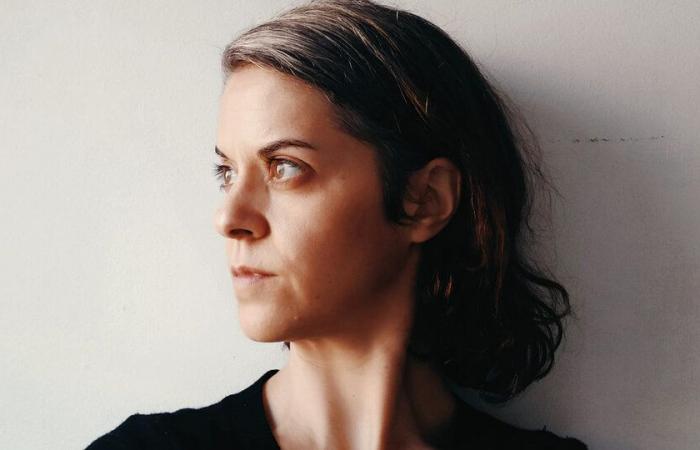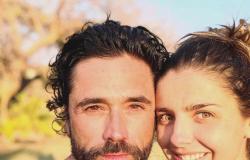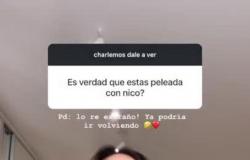
Poet, actress, theater director and teacher, Graduate in Literary Theory and Comparative Literature, Art History and Audiovisual Communication. All those labels did not prevent Macarena Wheat expose oneself to the maximum, but articulate the word in How I can (In the Editorial margin), a fictionalized autobiography so stark that it is difficult to believe the remarkable assimilation that the artist had of a traumatic childhood. Born 45 years ago in Madrid, Trigo came to Buenos Aires in 2002 and fell in love with Buenos Aires theater. Since then, he alternates between the province and the city of Buenos Aires presenting his independent theater works. This Saturday the proposal will be double: he will present the book and the work That’s why the band-aids, a biodramatic one-man show that offers the unique testimony of someone who grew up institutionalized, under the protection of the Spanish Minor Protection System, and found tools in literature and theater to forge her identity. The appointment is at 9 p.m. La Maza Theater (Mace 908).
Trigo had a pending score to write about his childhood, and in the context of the pandemic, where there were not many possibilities to imagine anything, he found many people “looking back.” “So, there was the context of that excess of time and the look towards the past. I was encouraged to return to that field of work, which was childhood and I began to see what would happen if I delved deeper from writing,” says Trigo about the source How I can. At that time, the Argentine editor and psychoanalyst Helga Fernández helped her a lot to energize the writing because “at times she accompanied that writing, opening new questions as the work progressed,” says Trigo.
-Is the book all autobiographical?
-The vast majority, to the extent that one believes that biography is a possible genre. Writing has that thing about rewriting and memory. But the book is very much framed in the autobiographical sphere.
-You expose yourself strongly in the narration. Was it difficult to assimilate your own story and then create this story?
-He had a history of being a sole proprietor That’s why the band-aids, which I mention in the book. That was my first experience writing about my life. It is a work that I premiered in 2014 and that I am still doing. In that one-man show I addressed a minimal part of what the story is, specifically what it was like to become institutionalized, that the Spanish Child Protection Service placed me first in a boarding school, then in the Functional Homes. I already had that experience of having written about the personal and, in addition, turning it into a biodramatic one-man show. So with that background, this writing was easier.
-You say in the book: “My life was lost in fleeing from childhood.” What happened when you finally made it?
-I didn’t succeed at all (laughter). Unfortunately I’m still there. There was also a desire for this book to function as a possible hinge, a certain closing structure that one wants to put on things, but for those of us who have had a complex childhood it is very difficult to get out of that context. Our way of seeing the world, our way of bonding, rewarding and punishing ourselves continues to be very determined by what we go through.. So at least in my case, I don’t feel like it’s something I’ve achieved.
-Also in a passage you point out: “I lived more as an orphan than as a daughter.” Did the book serve to expose those brands?
-Yes, maybe I’m not a person who hides much in relation to all this. For a long time, it was a shame to have had such a complex childhood, my family…For many years I could not face it and, in some way, now living in Argentina, also thanks to the sole proprietorship That’s why the band-aids, and the “ease” with which certain conversations and situations are approached here (because psychoanalysis makes it easier for people to be more open) I approached these issues in a much more open way than I would have ever done in Spain, because there A desire for normality continues to prevail, apparently, at least. Being normal is a very difficult thing.
-What did your father’s early absence imply? Because in a passage you describe situations of abuse…
-The thing is that since I was so young when all that happened, in the first years I loved my father very much, just like I loved my mother. In that area, when you are little, they are the references you have in the world. But he also disappeared as a figure when I was 4 years old. So, really the idealization process was brief and then he went on to become someone who was very demonized, let’s say. The issue went from one side to the other. It is a constant absence.
-How was the reconstruction of the boarding school stage?
-We were talking about leaving childhood. I have a pretty fresh memory. It’s something strange because now talking to many friends who are part of the book’s story, the friends from Spain were very surprised to find so much lucidity, as if it had happened yesterday. And for me, The boarding school, even though I was only there for a year and a half, also continues to be something that is very alive. I didn’t have to make a great effort to reconstruct everything that is part of the book because they are things that I even remember more clearly than I did in the past.
-Then came the stage of Functional Homes. What were the differences between being in a boarding school and in a Functional Home?
-Fortunately, now childhood policies are betting on ending the macrocenters. It has been understood for years that children need personalized attention and that it is impossible to take charge of large institutions with children. For me it was an abysmal change and during all the years I was there, from the age of 9 until I came of age, they were almost the best years of my life, in the sense of having something similar to tranquility, security, a structure. There was always the fear of what was going to happen next, how the film would continue when I turned 18, but at the time I was there there were only five children and I received the best attention that can be had in a context as complex as that.
-How did you live the experience of Buenos Aires independent theater in Buenos Aires in 2002? It was decisive, wasn’t it?
-It changed my life. I was only there for a month and everything I saw at that time was incredible. Theater was one of the things that sustained cultural activity in the city. And I had no idea that existed. So, it was seeing all that theater at its best, with incredible quality, with a very high political commitment, very reactive. It had nothing to do with the theater that I knew in Spain. And he broke my head. It was a month. And, from there, I decided that I had to return to Buenos Aires. I never imagined that my life would end on this side of the world, but what I saw in that month was very shocking.





